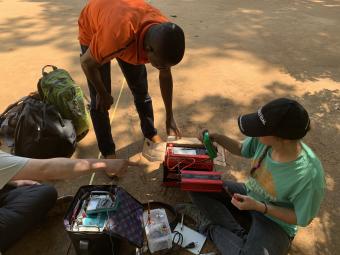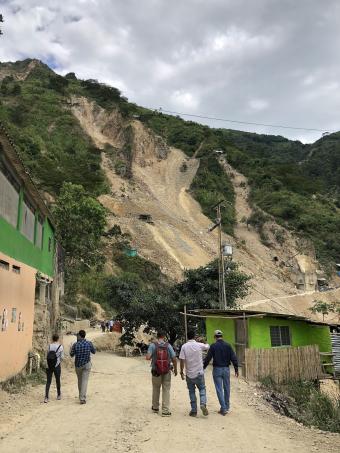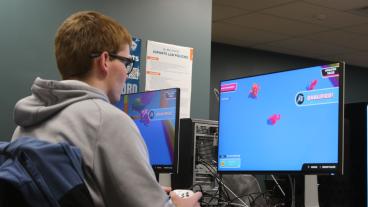Mines launches graduate program in humanitarian engineering and science

A Mines student uses low-cost geophysical instrumentation to locate water at depth for a Geoscientists Without Borders project in Benin. (Photos courtesy of Jessica Smith/Humanitarian Engineering)
A new graduate program at Colorado School of Mines will prepare technical professionals to harness the power of engineering, applied science and social science to foster sustainable community development around the world.
“A growing number of engineers and scientists want to understand how their work can contribute to broad social and environmental goals and how they can promote more socially responsible professional practices, whether that’s inside companies or through an NGO or government development agency,” said Jessica Smith, director of Humanitarian Engineering graduate programs. “Simply put, they have a desire to use their technoscientific training to make the world a better place.”
Mines’ Humanitarian Engineering and Science Graduate Program, which welcomed its inaugural cohort of students this fall, is now accepting applications for the Fall 2021 term. Both thesis and non-thesis Master of Science degrees are being offered, as well as an online graduate certificate that is targeted at working professionals and accepts applications on a rolling basis.

Students in the Master of Science program take half of their classes in the social sciences and half within a specific disciplinary track: humanitarian geophysics, environmental engineering or geological engineering. The social science courses are grounded in the interdisciplinary field of science, technology and society, which provides anthropological, sociological, historical and philosophical perspectives on engineering and applied science.
“This program is integrating cutting-edge social science, engineering and applied science,” said Elizabeth Reddy, one of the program’s core faculty members and a mentor for students in Mines’ prestigious Shultz Fellow Program.
Students come to the program with diverse technical expertise, driven to do what master’s student Casey Gibson, part of the inaugural class, described as “working on projects that benefit and empower traditionally marginalized members of communities.”
The HES program is a great choice for anyone with ambitions like Gibson’s, Reddy said. “The training they receive with us helps students develop the conceptual tools and practical skills to work directly with communities, co-defining problems and co-producing solutions. Instead of just designing gadgets that we hope will make a difference, our students can do what it takes to make humanitarian change. We’re preparing them for exceptional careers in dynamic interdisciplinary settings.”
Students in the program also have access to unique opportunities for field research, both in Golden’s backyard and across the globe. That could be sustainable mountain development in Colorado’s Rocky Mountains, or sustainable small-scale gold mining in rural Colombia and Peru.
“Among our inaugural cohort, many students aspire to do direct development work, working for a government agency like USAID, serving as Peace Corps volunteers or creating their own NGO, while others see sustainable development and community engagement work as increasingly important to the corporate world,” Smith said.
For more information about the Humanitarian Engineering and Science Graduate Program at Mines, go to https://humanitarian.mines.edu/mshes/.




